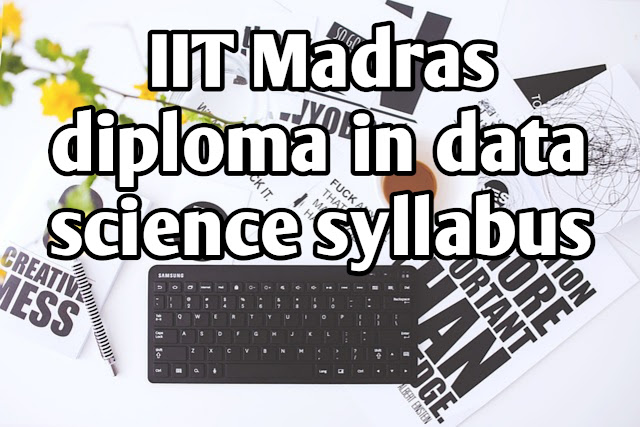The Indian Institute of Technology (IIT) Madras offers a Diploma in Data Science program in collaboration with UpGrad. This program is designed to provide learners with a comprehensive understanding of data science and its applications in various industries. The program covers topics such as data visualization, machine learning, statistics, data engineering, and data ethics.
The program is delivered online and includes live online classes, recorded lectures, case studies, and projects. The program also provides learners with access to industry experts and mentors who can help them develop their skills and knowledge.
The duration of the program is one year, and it requires learners to complete 10 courses and a capstone project. The program is designed for professionals who are interested in pursuing a career in data science or enhancing their skills in this field.
To be eligible for this program, learners must have a bachelor's degree in any discipline and should have completed at least 10+2 years of formal education. They should also have a basic understanding of mathematics and programming.
The program fee for the Diploma in Data Science program at IIT Madras is approximately INR 2,85,000 (as of April 2023). However, scholarships and installment options are available for eligible candidates.
The IIT Madras diploma in data science program
is a 1-year full-time course, comprising of 3 trimesters. Each trimester lasts for approximately 12-14 weeks, followed by a break of 2-3 weeks. Therefore, the total duration of the course is around 11-12 months.
Overall, the Diploma in Data Science program offered by IIT Madras is a great opportunity for individuals who want to gain expertise in data science and make a career in this field.
Completing a Diploma in Data Science from IIT Madras can provide several benefits, including:
- Comprehensive Curriculum: The program is designed to cover a broad range of topics in data science, including statistics, machine learning, data visualization, and big data technologies.
- Industry-Ready Skills: The course focuses on practical applications of data science concepts, providing students with the skills and tools they need to work in the industry.
- Prestigious Certification: The certificate is issued by IIT Madras, which is a highly regarded institute globally. Holding a certificate from such an esteemed institution can give you an edge in the job market.
- Career Opportunities: There is a high demand for data science professionals, and completing a course from IIT Madras can open up several job opportunities in data science, analytics, and related fields.
- Networking: The program allows students to interact with other professionals in the field and build a network that can be beneficial in their careers.
- Flexibility: The course is designed to be flexible, allowing students to balance their studies with their work or other commitments.
Overall, completing a Diploma in Data Science from IIT Madras can be a valuable investment for anyone looking to build a career in data science or related fields.
Completing a diploma in data science from IIT Madras can open up various job opportunities for you. With the growing demand for data-driven decision-making, companies across various industries are constantly seeking qualified data scientists who can extract insights from complex data sets.
Job opportunity
Some potential job roles that you could pursue after completing the diploma in data science from IIT Madras include:
- Data Analyst
- Data Scientist
- Business Analyst
- Machine Learning Engineer
- Artificial Intelligence (AI) Engineer
- Big Data Engineer
- Data Engineer
Predictive Analytics Scientist
Some popular companies that are actively hiring data science professionals in India include TCS, Infosys, Wipro, Accenture, Deloitte, IBM, Amazon, Flipkart, Google, and many more.
However, keep in mind that having a diploma in data science is just one aspect of the job market. It is equally important to develop your skills, gain practical experience, and keep yourself updated with the latest industry trends to succeed as a data scientist.
Address of IIT Madras
IIT Madras is located in Chennai, the capital city of the southern Indian state of Tamil Nadu. It is situated on Sardar Patel Road in Guindy, which is about 10 kilometers from Chennai International Airport and about 12 kilometers from Chennai Central Railway Station. IIT Madras is located in Chennai, which is the capital city of the Indian state of Tamil Nadu. Specifically, it is situated in the area known as Guindy, which is about 10 kilometers from the center of the city.
IIT Madras diploma in data science eligibility
- IIT Madras offers a postgraduate diploma program in data science. The eligibility criteria for this program are as follows:
- Candidates should have a bachelor's degree in engineering, science, mathematics, statistics, commerce, or economics from a recognized university.
- Candidates should have scored at least 60% or equivalent in their qualifying degree.
- Candidates should have a good understanding of mathematics and statistics, including calculus, linear algebra, probability, and statistics.
- Candidates should have some programming skills, preferably in Python.
- Candidates should have a minimum of two years of work experience.
Note:- that these are the general eligibility criteria, and there may be additional requirements specific to individual programs. It's always a good idea to check the program's official website for the most up-to-date and accurate information.
The Indian Institute of Technology (IIT) Madras offers a Postgraduate Diploma in Data Science program in collaboration with UpGrad. The program is designed to provide students with comprehensive knowledge and hands-on experience in data science.
The syllabus for the IIT Madras Postgraduate Diploma in Data Science program is as follows:
Term 1:
- Data Science for Engineers and Scientists
- Probability and Statistics
- Data Visualization
- Data Wrangling
- Machine Learning 1
Term 2:
- Inferential Statistics and Hypothesis Testing
- Regression Analysis
- Time Series Analysis
- Decision Trees and Random Forests
- Machine Learning 2
- Deep Learning
Term 3:
- Natural Language Processing
- Unsupervised Learning
- Big Data Technologies
- Reinforcement Learning
- Case Studies in Data Science
Term 1:
Mathematics for Data Science: Linear Algebra, Calculus, Probability Theory, and Statistics.
Python Programming: Python Programming Fundamentals, Data Structures, Functions, Classes, Numpy, Pandas, Matplotlib, and Scikit-learn.
Data Science Fundamentals: Introduction to Data Science, Data Types, Data Sources, Data Collection, Data Preprocessing, Exploratory Data Analysis, and Data Visualization.
Data Analytics: Descriptive Analytics, Inferential Analytics, Association Rules Mining, Market Basket Analysis, and Collaborative Filtering.
Data Mining: Introduction to Data Mining, Data Preprocessing, Classification, Regression, Clustering, Association Rule Mining, and Outlier Detection.
Business Analytics: Introduction to Business Analytics, Marketing Analytics, Financial Analytics, and Operations Analytics.
Term 2:
Statistical Inference and Hypothesis Testing: Probability and Probability Distributions, Point and Interval Estimation, Hypothesis Testing, ANOVA, Nonparametric Methods, Goodness of Fit Tests, and Bayesian Inference.
Regression Analysis: Simple and Multiple Linear Regression, Generalized Linear Models, Ridge and Lasso Regression, Polynomial Regression, Logistic Regression, and Time Series Regression.
Machine Learning Algorithms: Supervised and Unsupervised Learning, Decision Trees, Random Forests, k-Nearest Neighbors, Naive Bayes, Support Vector Machines, and Clustering Algorithms.
Optimization Methods: Linear Programming, Nonlinear Programming, Integer Programming, Dynamic Programming, Gradient Descent, Stochastic Gradient Descent, and Evolutionary Algorithms.
Data Visualization: Principles of Data Visualization, Data Types and Graphics, Types of Visualization, Design Principles, Dashboard Design, and Interactive Visualization.
Database Systems: Introduction to Relational Database Systems, SQL, Data Modeling, Entity-Relationship Diagrams, Normalization, and Database Design.
Term 3:
Big Data Analytics and Hadoop: Introduction to Big Data, Distributed and Parallel Computing, Hadoop Architecture, HDFS, MapReduce, Pig, Hive, Sqoop, Flume, HBase, Spark and Spark SQL, Streaming Data Processing with Spark Streaming.
Advanced Data Science Techniques: Advanced techniques for Data preprocessing, Exploratory Data Analysis, Feature Engineering, and Feature Selection. Dimensionality Reduction Techniques like PCA, SVD, t-SNE, UMAP, Isomap, LLE, and LDA.
Deep Learning: Artificial Neural Networks, Convolutional Neural Networks, Recurrent Neural Networks, AutoEncoders, Generative Adversarial Networks, Transfer Learning, Hyperparameter Tuning, and Model Optimization.
Natural Language Processing: Text Preprocessing, Text Representation, Text Classification, Named Entity Recognition, Sentiment Analysis, Topic Modelling, Word Embeddings, and Language Translation.
Time Series Analysis: Time Series Data Characteristics, Time Series Analysis Methods like ARIMA, SARIMA, Seasonal Decomposition, Time Series Forecasting using ARIMA, SARIMA, and Prophet.
Reinforcement Learning: Introduction to Reinforcement Learning, Q-Learning, Deep Q-Learning, Actor-Critic Methods, Policy Gradients, and Model-based Reinforcement Learning.
This is just an overview, and there may be slight changes in the syllabus from time to time. The detailed syllabus can be obtained from the official website of IIT Madras.
The program also includes several projects and assignments to give students hands-on experience with real-world data science problems. Students are expected to complete the program in 11 months.















0 टिप्पणियाँ
If you have any doubt, please let me know